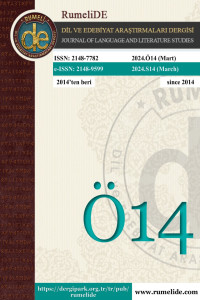Öz
Kaynakça
- Blackmon, D. A. (2009). Slavery by Another Name: The Re-Enslavement of Black Americans from the Civil War to World War II. New York: Anchor Books.
- Eyerman, R. (2002). Cultural Trauma: Slavery and the Formation of African American Identity. London: Cambridge UP.
- Hatch, James V. and Shine, Ted, eds., 1996. Black Theatre USA: Plays by African Americans, The Recent Period 1935 – Today. New York: The Free Press. Print.
- Hughes, Langston, 1993. The Big Sea. 1940. New York: Hill& Wang. Reprint.
- Hughes, Langston, 1996. Mulatto. Black Theatre USA: Plays by African Americans, The Recent Period 1935 – Today. James V. Hatch and Ted Shine, eds. New York: The Free Press. Print.
- McNeese, T. (2007). The Civil Rights Movement: Striving for Justice. New York: Chelsea House Publication.
- Neal, Larry, 1968. ‘And Shine Swam On’. In LeRoi Jones and Larry Neal, eds. Black Fire: An Anthology of Afro-American Writing. New York: William Morrow, 1968. Print.
- Rebhorn, M. (2003). Flaying Dutchman: Maschism, Minstrelsy, and the Gender Politics of Amiri Baraka's Dutchman. Callaloo, 26(3), 796-812. Retrieved 06 12, 2021, from http://www.jstor.org/stable/3300727
- Roudane, Matthew, 2007. Safe at home?: August Wilson’s Fences. The Cambridge Companion to August Wilson. Ed. Christopher Bigsby. New York: Cambridge UP, 2007.
- Savran, David, 2006. ‘August Wilson’, in Bryer and Hartig, eds., Conversations with August Wilson. Jackson: University of Mississippi Press. Print.
- Smethurst, James. 2002. Don’t Say Goodbye to the Porkpie Hat: Langston Hughes, the Left, and the Black Arts Movement. Callaloo, Vol. 25, No. 4 (Autumn), pp. 1224-1237. Web http://www.jstor.org/stable/3300281 on 13/06/2013.
- Tracy, S. C. (Ed.). (2003). A Historical Guide to Langston Hughes. London: Oxford UP.
- Watts, J. (2001). Amiri Baraka: The Politics and Art of a Black Intellectual. New York: NYU Press.
- Webb, C., & Brown, D. (2007). Race in the American South: From Slavery to Civil Rights. Edinburgh: Edinburgh UP.Baraka, Imamu Amiri, 1971. The Baptism and the Toilet. New York: Ever Green. Print.
- Wilson, August, 1988. Joe Turner’s Come and Gone. New York: Penguin. Print.
Öz
Notwithstanding the belated emergence and subsequent acknowledgment of African American dramaturgy, its impact has proven salient in elucidating cultural, social, and political occurrences. Thus, this study constructs a triangular framework for twentieth-century African-American drama, delineating three distinct periods through the analysis of selective works by Langston Hughes, Amiri Baraka (formerly LeRoi Jones), and August Wilson. The selected literary works delineate the developmental trajectory of African American men across the dimensions of individuality, manhood, and fatherhood. By juxtaposing the historical context of each playwright's oeuvre with the unfolding chapters of the Civil Rights Movement, this study endeavors to unravel the intricate interplay between artistic expression and the broader socio-political landscape. In elucidating the multifaceted dimensions of African American drama through thematic underpinnings, narrative strategies, and stylistic choices of each writer, this study provides a nuanced understanding of how these playwrights grappled with the exigencies of their times and aims to contribute to a richer comprehension of the complexities inherent in the intersection of artistic creation and social activism within the African American literary tradition. The stages of creating an identity, defiant resistance to the status quo and a mature protestation tone are three selective eras that have been associated with the works to understand the parallelism between dramatic works and civil rights movement.
Anahtar Kelimeler
African-American Drama Masculinity Langston Hughes Amiri Baraka August Wilson
Kaynakça
- Blackmon, D. A. (2009). Slavery by Another Name: The Re-Enslavement of Black Americans from the Civil War to World War II. New York: Anchor Books.
- Eyerman, R. (2002). Cultural Trauma: Slavery and the Formation of African American Identity. London: Cambridge UP.
- Hatch, James V. and Shine, Ted, eds., 1996. Black Theatre USA: Plays by African Americans, The Recent Period 1935 – Today. New York: The Free Press. Print.
- Hughes, Langston, 1993. The Big Sea. 1940. New York: Hill& Wang. Reprint.
- Hughes, Langston, 1996. Mulatto. Black Theatre USA: Plays by African Americans, The Recent Period 1935 – Today. James V. Hatch and Ted Shine, eds. New York: The Free Press. Print.
- McNeese, T. (2007). The Civil Rights Movement: Striving for Justice. New York: Chelsea House Publication.
- Neal, Larry, 1968. ‘And Shine Swam On’. In LeRoi Jones and Larry Neal, eds. Black Fire: An Anthology of Afro-American Writing. New York: William Morrow, 1968. Print.
- Rebhorn, M. (2003). Flaying Dutchman: Maschism, Minstrelsy, and the Gender Politics of Amiri Baraka's Dutchman. Callaloo, 26(3), 796-812. Retrieved 06 12, 2021, from http://www.jstor.org/stable/3300727
- Roudane, Matthew, 2007. Safe at home?: August Wilson’s Fences. The Cambridge Companion to August Wilson. Ed. Christopher Bigsby. New York: Cambridge UP, 2007.
- Savran, David, 2006. ‘August Wilson’, in Bryer and Hartig, eds., Conversations with August Wilson. Jackson: University of Mississippi Press. Print.
- Smethurst, James. 2002. Don’t Say Goodbye to the Porkpie Hat: Langston Hughes, the Left, and the Black Arts Movement. Callaloo, Vol. 25, No. 4 (Autumn), pp. 1224-1237. Web http://www.jstor.org/stable/3300281 on 13/06/2013.
- Tracy, S. C. (Ed.). (2003). A Historical Guide to Langston Hughes. London: Oxford UP.
- Watts, J. (2001). Amiri Baraka: The Politics and Art of a Black Intellectual. New York: NYU Press.
- Webb, C., & Brown, D. (2007). Race in the American South: From Slavery to Civil Rights. Edinburgh: Edinburgh UP.Baraka, Imamu Amiri, 1971. The Baptism and the Toilet. New York: Ever Green. Print.
- Wilson, August, 1988. Joe Turner’s Come and Gone. New York: Penguin. Print.
Ayrıntılar
| Birincil Dil | İngilizce |
|---|---|
| Konular | İngiliz ve İrlanda Dili, Edebiyatı ve Kültürü |
| Bölüm | Dünya dilleri, kültürleri ve edebiyatları |
| Yazarlar | |
| Yayımlanma Tarihi | 21 Mart 2024 |
| Gönderilme Tarihi | 5 Ocak 2024 |
| Kabul Tarihi | 20 Mart 2024 |
| Yayımlandığı Sayı | Yıl 2024 Sayı: Ö14 |

